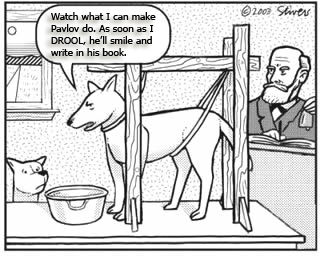
Repetition Compulsion and Stimulus Generalization
A young girl with an alcoholic father might get beatings instead of the love she needs from him. Later in life she is attracted to men who trigger the possible resolution of this unmet need for love. The repetition-compulsion is to try and get the love from the desired object (father), and later from an object representation (teacher, boyfriend, husband).
Object representations are chosen based on resemblance to the original desired object, which includes the alcoholism and propensity to beat, so she continually ends up with alcoholic men that abuse her, even if it takes years for that behavior to manifest.
It is not necessary to understand any of this to benefit from NET. The information is presented here for those who wish to cognitively understand the principles behind NET.
 Watch what I can make Pavlov do. As soon as I drool, he'll smile and write in his little book. Stimulus generalization refers to the tendency for conditioned responses (NEC's) to be evoked by any stimulus that is similar to the original conditioned stimulus. An example of this is Pavlov's dog salivating to a wide range of bell sounds.
Watch what I can make Pavlov do. As soon as I drool, he'll smile and write in his little book. Stimulus generalization refers to the tendency for conditioned responses (NEC's) to be evoked by any stimulus that is similar to the original conditioned stimulus. An example of this is Pavlov's dog salivating to a wide range of bell sounds.
Stimulus generalization may occur in a little boy with an abusive mother. The boy learns that whenever Mom is angry or raises her voice, that the best way to avoid punishment is to pacify and please her. This is an appropriate, survival-based response for the child. However, as an adult, whenever there is a potential conflict with another person (stimulus generalization), the man is conditioned to pacify and please. This conditioned response no longer serves, yet he is unconsciously compelled to behave this way, preventing him from expressing himself and having his needs met in business and personal relationships. The repetition-compulsion in this case may appear as an attraction to those that will abuse him, with a conditioned response to pacify and please them.
When conditioning and stimulus generalization occur in response to words we call this semantic conditioning and semantic generalization. When lemon juice contacts the tongue, the body secretes saliva; however, if the sound of the word "lemon" alone results in salivation, then we have semantic conditioning. If the sound of the word "grapefruit" produced salivation, then we have semantic generalization. This explains why the patient's arm strength will change in response to the practitioner's words.
Since Pavlov's dog, conditioned reflexes that have been studied in man include:
- Sweat secretion
- Contraction and relaxation of smooth muscle in the walls of arteries
- Blink reflex
- Contraction and dilation of the pupil of the eye
MORE ON NET:
THE DEVELOPMENT OF NETHIDDEN AFFECTHOW DOES NET CORRECT EMOTIONAL IMBALANCES?
